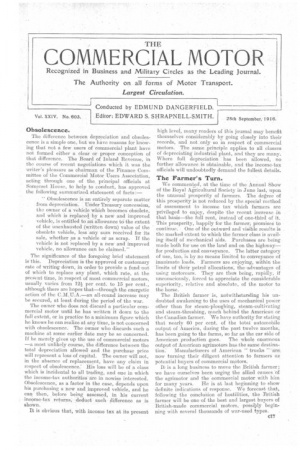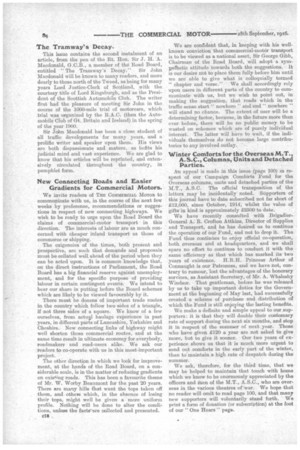Obsolescence.
Page 1

Page 2

If you've noticed an error in this article please click here to report it so we can fix it.
The difference between depreciation and obsolescence is a simple one, but we have reasons for knowing that not a few users of commercial plant have not formed either a clear or proper conception of that difference. The Board of Inland Revenue, in the course of recent negotiations which it was the writer's pleasure as chairman of the Finance Committee ofthe Commercial Motor Users Association, acting through one of the principal officials at Somerset House, to help to conduct, has approved the following summarized statement of facts:— " Obsolescence is an entirely separate matter from depreciation. Under Treasury concession, the owner of a vehicle which becomes obsolete, and which is replaced by a new and improved vehicle, is entitled to an allowance to the extent • of the Unexhansted (written down) value of the obsolete vehicle, less any sum received for its sale, whether as a vehicle or as scrap. If the vehicle is not replaced by a new and improved vehicle, no allowance can be claimed."
The significance of the foregoing brief statement is this. Depreciation is the approved or customary rate of writing down, in order to provide a fund out of which to replace any plant, which rate, at the present time, in respect of most commercial motors, usually varies from 12.i. per cent. to 15 per cent., although there are hopes that—through the energetic action of the C.M.U.A.—an all-round increase may be secured, at least during the period of the war.
The owner who does not discard a particular commercial motor until he has written it down to the full extent, or in practice to a minimum figure which he knows he can realize at any time, is not concerned with obsolescence. The owner who discards such a machine at some earlier date may be so concerned. If he merely gives up the use of commercial motors —a. most unlikely course, the difference between the total depreciation allowed and the purchase price will represent a loss of capital. The owner will not, in the absence of replacement, have any claim in respect of obsolescence: His loss will be of a class which is incidental to all trading, and one in which the income-tax authorities are in nowise interested. Obsolescence, as a factor in the case, depends upon his purchasing a new and improved vehicle, and he can then, , before being assessed, in his current income-tax .returns; deduct such difference as is shown.
It is obvious that, with income tax at its present high level, many readers of this journal may benefit themselves considerably by going closely into their records, and not only so in respect of commercial Motors. 'The same .principle applies to all classes of depreciating industrial plant, and they are many. Where full, depreciation has been allowed, no further allowance is obtainable, and the income-tax officials will undoubtedly demand the fullest, details.
The Farmer's Turn.
We commented, at the time of the Annual Show of the Royal Agricultural Society in June last, upon the unusual prosperity of farmers. The degree of this prosperity is not reduced by the special method of assessment to income tax which farmers are privileged to enjoy, despite the recent increase in that basis—the full rent, instead of, one-third of it. This prosperity, happily for the farmer, promises to continue. • One of the outward and visible results is the rnarked-eXtent, to which the farmer class is availing itself of mechanical aids. Purchases are being made both for use on the land and on the highway— for productien And conveyance, The latter category of use, too, is by no means limited to conveyance of inanimate loads. Farmers are enjoying, within the limits of their petrol allocations, the advantages of using motorcars. They are thus being, rapidly, if unconsciously, forced to appreciate the considerable superiority, relative and absolute, of the motor to the horse.
The British farmer is, notwithstanding his undoubted awakening to the uses of mechanical power other than for steam-ploughing, steam-cultivating and steam-threshing, much behind the American or the Canadian farmer. We have authority for stating that nearly 60 per cent. of the total automobile output of America, during the past twelve months, has been going to the farms, so far as the car side of American production goes. The whole enormous output of American agrimotors has the same destination.' Manufacturers of American " trucks " are now turning their diligent attention to farmers' Aspotential buyers of commercial motors. It. is a long business to move the British farmer; we have ourselves been urging the allied causes -of the agrimotor and the commercial motor with him for many years. He is at last beginning to show definite indications of response. We forecast that, following the concluSion of hostilities, the British farmer will be one of the best and largest buyers of British-made commercial motors, •possibly beginning with several thousands of war-used :types.
The Tramway's Decay.
This issue contains the second instalment of an article, from the pen of the Rt. Hon. Sir J. H. A. Macdonald, G.C.B., a member of the' Road Board, entitled "The Tramway's Decay." Sir John Macdonald will be known to many readers, and more dearly to those north of the Tweed, as being for many years Lord Justice-Clerk of Scotland, with the courtesy title of Lord Kingsburgh, and as the President of the Scottish Automobile Club. The writer first had the pleasure of meeting Sir John in the course of the 1000-mile trial of motorcars, which trial was organized by the R.A.C. (then the Automobile Club of Gt. Britain and Ireland) in the spring of the year 1900.
Sir John .Macdonald has been a close student of all traffic developments for many years, and a prolific writer and speaker upon them. His views are both dispassionate and mature, as befits his judicial mind and vast experience. We are glad to know that his articles will be reprinted, and extensively circulated throughout the country, in pamphlet form.
New Connecting Roads and Easier Gradients for Commercial Motors.
We invite readers of THE COMMERCIAL MOTOR to communicate with us, in the course of the next few weeks by preference, recommendations or suggestions in respect of new connecting highways. We wish to be ready to urge upon the Road Board the claims of commercial-motor transport in this direction. The interests of labour are as much concerned with cheaper inland transport as those of commerce or shipping.
The exigencies of the times, both present and prospective, are such that demands and proposals must be collated well ahead of the period when they can be acted upon. It is common knowledge that, on the direct instructions of Parliament, the Road Board has a big financial reserve against unemployment, and for the specific purpose of providing labour in certain contingent events. We intend to bear our share in putting before the Board schemes which are likely to be viewed favourably by it. There must be dozens of important trade routes in the country which follow two sides of a triangle, if not three sides of a square. We know of a few ourselves, from actual haulage experience in past years, in different parts of Lancashire, Yorkshire and Cheshire. New connecting links of highway might well shorten those commercial routes, and at the same time result in ultimate economy for everybody, roadmakers and road-users alike. We ask our readers to co-operate with us in this most-important project.
The other direction in which we look for improvement, at the hands of the Road Board, on a considerable scale, is in the matter of reducing gradients on existing roads. This has been a favourite theme of Mr. W. Worby Beaumont for the past 20 years. There are many hills that want the tops taken off them, and othevs which, in the absence of losing their tops, might well be given a more uniform profile. Nothing will be done to alter the conditions, unless the facts' are collected and presented. 018 We are confident that, in keeping with his wellknown conviction that commercial-motor transport is to be viewed as a national asset, Sir George Gibb, Chairman of the Road Board, will adopt a symDathetic attitude towards both the suggestions. It is our desire not to place them fully before him until we arc able to give what is colloquially termed " chapter and verse." We shall accordingly rely upon users in different parts of the country to communicate with us, but we wish to point out, in making the suggestion, that roads which in the traffic sense start" nowhere "and end " nowhere " will stand no chance. The extent of user will be a determining factor, because, in the future more than ever before, there will be no public money to be wasted on schemes which are of purely individual interest. The latter will have to wait, if the individuals themselves do not become large contributories to any involved outlay.
Winter Comforts for the Overseas ALT., A. S.C., Columns, Units and Detached Parties.
An appeal is made in this issue (page 100) in respect of our Campaign Comforts Fund for the Overseas columns, units and detached parties of the M.T., A.S.C. The official transposition of the letters may be incidentally noted. Supporters of this journal have to date subscribed not far short of .12,000, since October, 1914, whilst the value of gifts in kind is approximately £2500 to date.
We have recently consulted with BrigadierGeneral A. R. Crofton Attkins, Director of Supplies and Transport, and he has desired us to continue the operation of our Fund, and not to drop it. The Fund thus continues to enjoy official co-operation, both overseas and at headquarters, and we shall spare no effort to continue to conduct it with the same efficiency as that which has marked its two years of existence. H.R.H. Princess Arthur of Connaught is our Patroness, and we have not, contrary to rumour, lost the advantages of the honorary services, as Assistant Secretary, of Mr. A. Whalesby Windsor. That gentleman, before he was released by us to take up important duties for the Government at the beginning of May last, had successfully created a scheme of purchase and distribution of which the Fund is still enjoying the lasting benefits.
We make a definite and simple appeal to our supporters: it is that they will double their customary rate of support during the next six months, and stop it in respect of the summer of next year. Those who have given £120 a year are not asked to give more, but to give it sooner. Our two years of experience shows us that it is much more urgent to send out comforts in the early part of the winter, than to maintain a high rate of despatch during the summer.
We ask, therefore, for the third time, that we may be helped to maintain that touch with home which we know to be enormously appreciated by the officers and men of the M.T., A.S.C., who are overseas in the various theatres of 'war. We hope that no reader will omit to read page 100, and that many new supporters will voluntarily stand forth. We print a form of donation (or subscription) at the foot of our " One Hears" page.






















